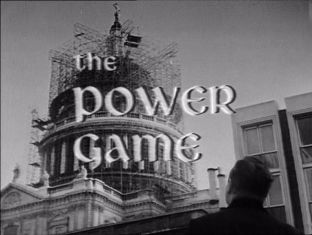

The Power Game
A novel of the TV series adapted by JOHN BURKE
“Wilder looked from father to son with reluctant approval.But he was still calm, and still smiling to himself with that thin, dangerous little smile of his."
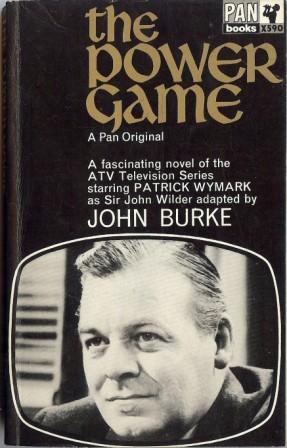
Pan Books Ltd, 1966. ©John Burke and ATV Network Ltd. 168 pages
In the days before DVD or home video, there were limited ways of repeating the experience of a film or TV show. A few movies were made available as Super 8 film digests and there were occasional soundtrack LP’s such as the Burton-Taylor ‘Who’s Afraid of Virginia Wolf?’ or ‘Hancock’s Half Hour’. But the novelisation was the mass market solution.
The ‘King’ of the novelisers was undoubtedly John Burke, whose career stretched from ‘The Entertainer’ in 1960 to ‘The Bill’ in the 1980’s. Born in 1922, Burke worked in publishing, as a public relations officer for Shell, and as a story editor for 20th Century Fox, before becoming a freelance writer. Burke had already established himself writing short stories for the British science fiction magazine “New Worlds”, and had also published several original novels.
Among his novelisations were ‘Dr Terror’s House of Horrors’ (1965), ‘That Magnificent Air Race’ (1965 – the movie was renamed ‘Those Magnificent Men in Their Flying Machines’), ‘The Hammer Horror Omnibus’ (1967) and ‘Moon Zero Two’ (1969). Under the alias of Robert Miall, Burke also wrote novelisations of most ITC film series such as ‘UFO’ and ‘Kill Jason King’.
As Christopher Fowler observed in The Independent (13 February 2011), Burke rarely made a standard transcript of the film or TV episode. “Often, his narratives feel more structurally cohesive than the works on which they were based, and have a clearly identifiable style that marks them with the author’s imprimatur.”

Burke’s novelisation of ‘The Power Game’ demonstrates this approach magnificently. Burke adapts Point of Balance, Trade Secret and Confound Their Politics but also draws in scenes from other episodes such as ‘Lady For A Knight’. Burke uses the character of the security officer Hartley (played by Nigel Green in ‘Point of Balance’) to frame the adaptation. The novel opens with the General asking Hartley to look into the relationship between civil servant Susan Weldon and Sir John Wilder, Hartley reviews the press record of how Wilder edged himself into Bligh Construction and picks up some office gossip from the ex-technical director who saw himself as rightful Managing Director. Having established the background, Burke relates the televised investigation from 'Point of Balance.' But where the TV episode ends with the General deciding to end the investigation of Susan Weldon , Burke has Hartley conclude that, “There was something in the relationship between Wilder and that girl which needed probing further. There was always something if you were allowed to go far enough, for long enough.” Burke invents a friendship between Hartley and Sefton Kemp , the new Secretary to the National Export Board. While not part of the TV show, the friendship is credible. “Kemp was much more his kind of man than Townley had been. Kemp would be the first to alert him if there was any promising flicker of a scandal.”
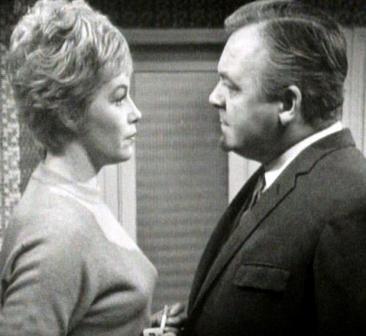
Burke also shows some efficiency in viewing events through the relationship between Susan Weldon and Wilder. Pamela Wilder is glossed over in a couple of sentences. Hartley concludes that, “She attended various official functions with her husband and they were always civil to each other in public, but little more than that.” Later on, Susan Weldon recalls a magazine photograph, “Sir John and Lady Wilder arm in arm as they emerged from their hotel (in Switzerland)”. Burke gives no indication that this marks the aftermath of Pamela’s affair with Frank Hagadan. While he lets Susan recall Wilder’s comment that the holiday was necessary because, “there were things he wanted to talk to (Pamela) about,” Burke leaves Susan oblivious, and only a TV viewer would pick up on the significance.
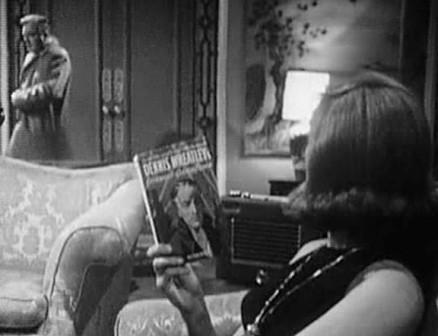
With Hagadan returning in the second series of The Power Game, it is possible to speculate that a second novelisation would have focussed on the Wilder/Pamela/Hagadan triangle. However, that was never to be. Interestingly, the decision to eliminate Pamela from the story means that Burke creates an alternate view of the scene in ‘Confound Their Politics’ where MP’s protest about Wilder’s membership of the National Export Board. In the TV episode, Wilder and Pamela hear the news at home, but Burke depicts Susan alone in her flat.
“Susan made herself a mug of hot chocolate and threw it away without tasting it. Spinster school-teachers might drink hot chocolate every night before going to bed, but it didn’t fit with the image of the wild, abandoned mistress of a tycoon. Susan poured herself a stiff whisky and gagged as she drank it.”
“The radio announcer began to summarize the news headlines. Suddenly the words and phrases shaped themselves into significance. ‘What they call “gross preference”. One of the N.E.B. members concerned was named as Sir John Wilder, a former aviation expert.’ Susan stood quite still with the empty glass warming in her hand. She wondered how many of their mutual acquaintances would have heard this announcement. There would be a great rubbing of hands and eager speculation.”
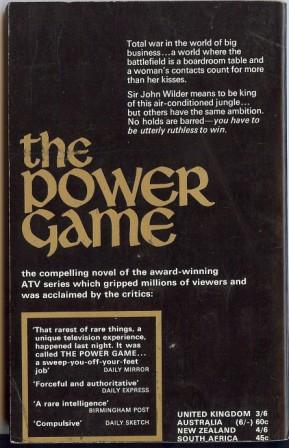
Another interesting choice is that Burke makes no attempt to get inside John Wilder’s head. His speech may be reported, but Wilder is always shown from the viewpoint of another character. Wilder is initially described by a reporter as having “the features of an amiable frog, but not as flaccid as a frog’s: there was a muscular tightness beneath the skin which could snap the whole face into decisive fury in a split second.”
Later, Hartley meets Wilder and sums up the appeal of the character, “This might be an opponent, but it was an opponent worthy of respect. It was not just that he brought with him the aura of his reputation.; the man himself exuded an aura of power and of ruthlessness. Hartley found him quite admirable.”
Burke maintains the same approach when Wilder is fighting for his survival. Burke relates the scenes where Kemp demands his resignation, and the Bligh’s tell him that without his seat on the NEB, he has no power within the firm. But of his fight back, nothing is reported directly. Instead, a drunken Kemp meets with Hartley who speculates how Wilder must have researched to prove the conspiracy and then negotiated with the Minister. “The cut and thrust of the conversation he had with the Minister would probably always be secret…But the general tenor of it could be in no doubt: The results spoke for themselves.”
“The Power Game” is indeed “a fascinating novel of the ATV Television Series”. Thanks to John Burke’s ingenuity, it remains worthwhile, even now the series itself is available on DVD.